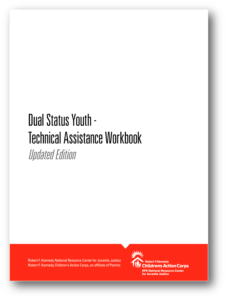 The RFK National Resource Center is pleased to present the Dual Status Youth – Technical Assistance Workbook, Updated Edition to enhance its practical guidance for state and local jurisdictions on behalf of dual status youth. The highly successful framework, originally developed in 2003, continues to be presented in its original form given the successful outcomes it has generated for dual status youth and their families—as well as multi-system, youth-serving agencies throughout the country—for nearly two decades.
The RFK National Resource Center is pleased to present the Dual Status Youth – Technical Assistance Workbook, Updated Edition to enhance its practical guidance for state and local jurisdictions on behalf of dual status youth. The highly successful framework, originally developed in 2003, continues to be presented in its original form given the successful outcomes it has generated for dual status youth and their families—as well as multi-system, youth-serving agencies throughout the country—for nearly two decades.
This updated Technical Assistance Workbook provides access to a wealth of practical new examples of replicable products (e.g., memoranda of understanding, information sharing agreements, policies, procedural narratives, multi-disciplinary team structure and operations, system performance and outcome measures, data collection and reporting methods) that will support state and local jurisdictions seeking to undertake this important work. The RFK National Resource Center’s Dual Status Youth Practice Network and Peer Mentors are featured, demonstrating how peer-to-peer partnerships can assist jurisdictions in effectively navigating through challenges and obstacles to create successful outcomes. Additionally, the updated Technical Assistance Workbook highlights the increased importance of Implementation Science principles and tenets to ensure sustainability of dual status youth initiatives.
![]() Like its predecessor, the updated Technical Assistance Workbook serves as a companion piece to the Guidebook for Juvenile Justice and Child Welfare System Coordination and Integration: A Framework for Improved Outcomes, Third Edition (2013). Look for this icon (seen left) in the workbook to reference to additional materials found in the Guidebook.
Like its predecessor, the updated Technical Assistance Workbook serves as a companion piece to the Guidebook for Juvenile Justice and Child Welfare System Coordination and Integration: A Framework for Improved Outcomes, Third Edition (2013). Look for this icon (seen left) in the workbook to reference to additional materials found in the Guidebook.
Currently, as we release this updated Technical Assistance Workbook, the RFK National Resource Center is working in five states and nine jurisdictions to positively impact multi-system initiatives on behalf of dual status youth. These efforts, combined with our long history of intensive technical assistance partnerships, have resulted in lessons learned, replicable products, and practice methods in more than thirty jurisdictions across the country. We are pleased to present the most current and positive opportunities in the Dual Status Youth – Technical Assistance Workbook, Updated Edition, which we believe will support your commitment to improve outcomes for these too-often marginalized youth and their families.
The Dual Status Youth – Technical Assistance Workbook, Updated Edition is available in our online resource library: https://rfknrcjj.org/resources/dual-status-youth/.
